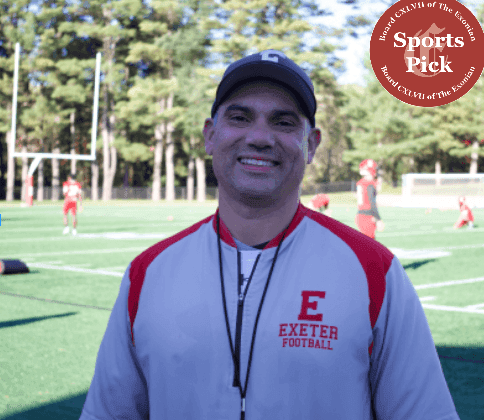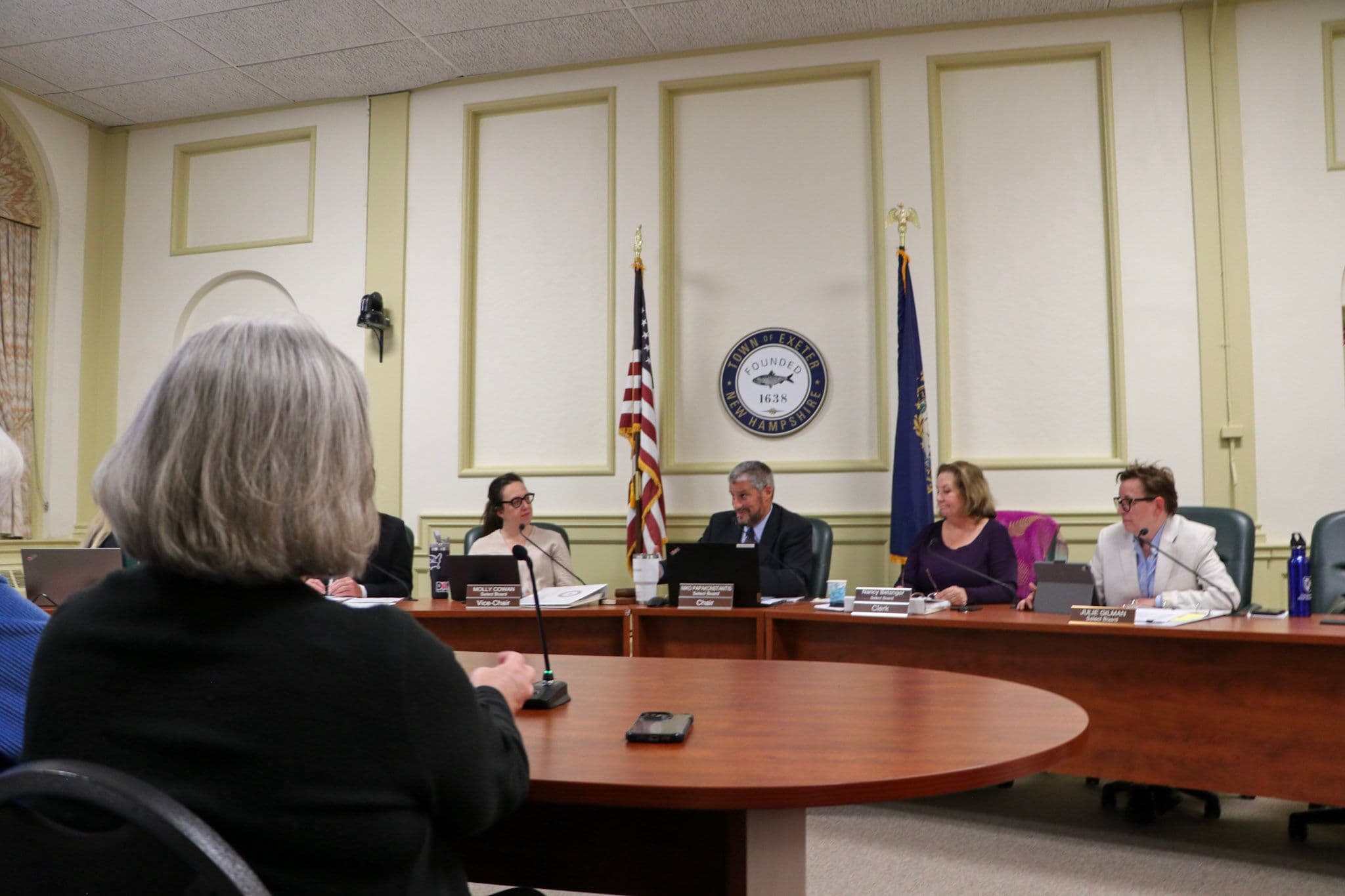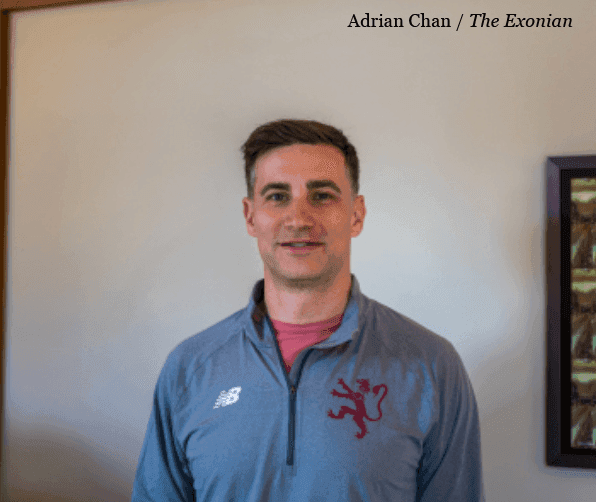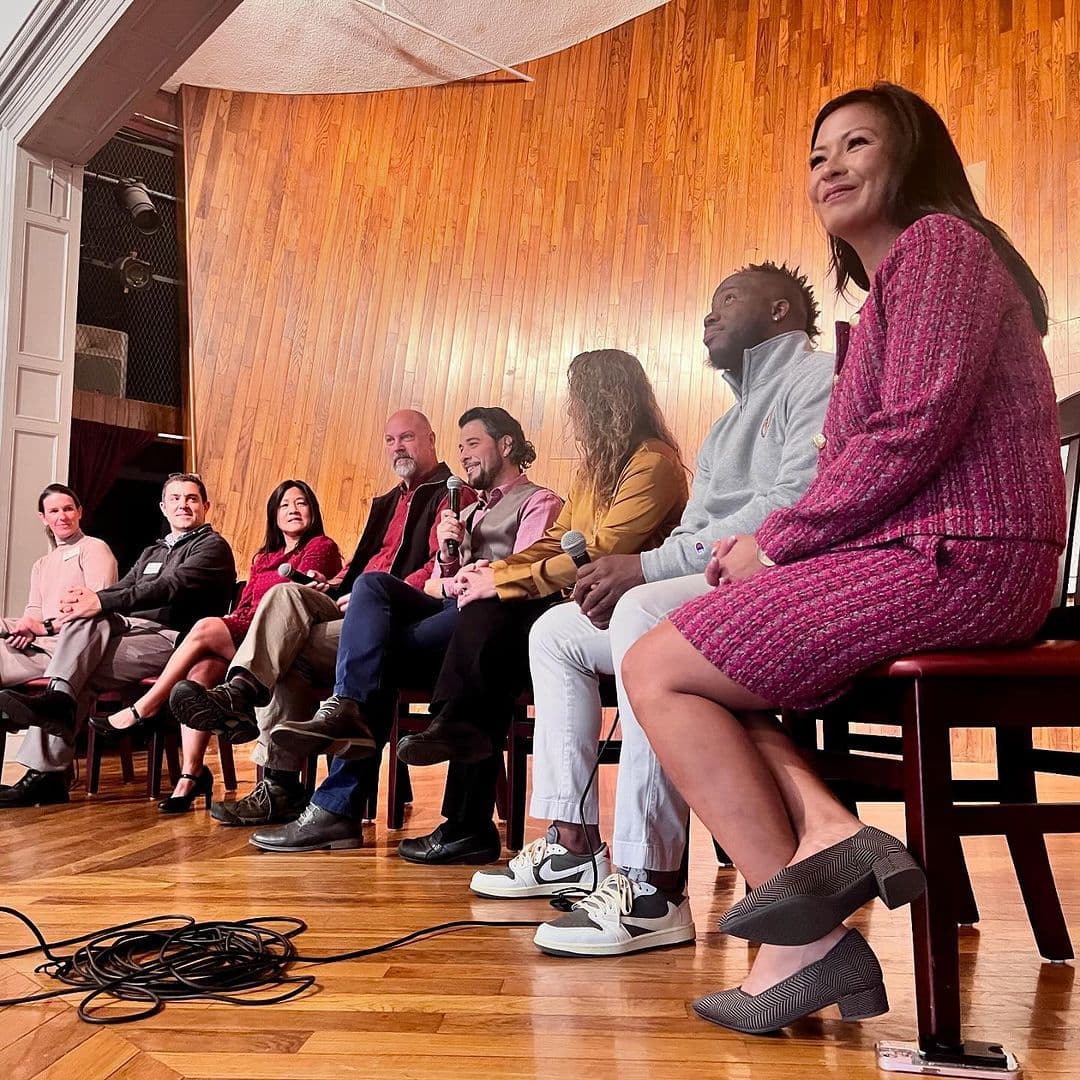Every Tuesday after check-in, Michelle Soucy—a beloved three-year member of Hoyt Hall—hosts a smoothie night, giving Hoytians a chance to grab a healthy snack while they study. “I want them to have something nutritious, so I bring the ingredients in and make smoothies,” she explained. Beyond just a quick snack, her check-ins often spark easygoing conversations, making the Hoyt common room a natural gathering spot for students looking to unwind. Ms. Soucy has served as an instructor in health at Exeter since 2008, and throughout her tenure, she has become certified as a grief educator, a nutritionist, and a positive educator, as well as serving as an advisor for Fight Club.
A veteran in the world of college health education, Soucy often saw Exeter’s campus on a drive to visit family who lived near the Academy. Following a job opening, Soucy applied but surprisingly did not get the job, a loss that would have cost the Academy dearly. “I was so excited. I was like, I want to work here. This is exactly what I want to do. And they didn’t hire me,” Soucy shared. However, a year later, the position opened up again, leading Dean Carol Cahalane (who was the Health Education Department chair at the time) to hire Soucy.
Since then, Soucy served as dorm head of McConnell for 12 years and was the class advisor to the classes of 2013, 2016, and 2026. Unsurprisingly, the challenges of teaching health at a college institution are very different from those at a high school such as Exeter. “I mostly worked with college students. So it was very different in terms of working with students whose parents were more involved in their life as opposed to college students,” she said. “There was definitely a learning curve coming to Exeter and understanding what a boarding school life is like and what it meant to live and work in a boarding school.” Excluding the changes in life, Soucy also attributed Harkness to a “huge learning curve” from the typical lecture style you would find in colleges.
At Exeter, Soucy has not only grown as an individual but as a professional in the health sector. “Exeter has been very generous in providing educational opportunities to me, for me to expand my knowledge,” she shared. “That’s the thing with health: it changes all the time. It’s not like you learn it, and it’s the same thing for 20 years. New illnesses come in.”
For Soucy, health is a way to see how students can learn about their well-being and develop skills that help them stay healthy in an independent boarding school. Her tagline in classes is: “I’m not here to help you survive Exeter, I’m here to help you thrive at Exeter.”
Soucy is a beloved and appreciated dorm faculty within Hoyt Hall. Many members of Hoyt had a lot to say about their appreciation for her presence in the dorm. Especially appreciated were her smoothie nights, a favorite amongst many Hoytians.
Eli Pratt, senior and proctor in Hoyt, commented, “I love coming to the common room to chat with her and get a famous Soucy smoothie. Her smoothie Tuesdays and grape Saturdays are the best.” Ms. Soucy is often described as “down to earth” and genuine.
Sofia Wang, also a proctor and senior in Hoyt, commented, “My favorite thing about Ms. Soucy is her down-to-earth personality and her genuine care for the well-being of students in Hoyt. She always makes sure to see everyone’s faces during duty nights and goes out of her way to check in with you about your day. She’s a very supportive and important member of the dorm community and I genuinely couldn’t imagine Hoyt without her.”
Prep Abbe Sarpong noted her gratitude for the smoothie nights, adding, “It’s such a small thing, but it really shows how much she cares about making the dorm feel like a home.”
Lucy Jung, proctor of Hoyt and senior, remarked on Ms. Soucy’s memorable duty nights and her innovative conundrum-solving. “Every Tuesday night, Soucy stations herself in the Hoyt common room, making herself available for any Hoytian who wants support, needs someone to talk to, or just wants to say hello. I usually stay in the common room with her on Tuesday nights, and I see her giving excellent advice to lowerclassmen, going ‘mom-mode’ on uppers who haven’t been getting enough sleep, and laughing with seniors,” Jung explained. “Her reliable presence supports all Hoytians. I myself have asked for Soucy’s advice on multiple occasions, sometimes at ridiculous hours, and she’s helped me through all those situations. I love talking through my conundrums with her—she is a fantastic and reliable confidant.”
Many Hoytians enjoy having chats with her after a long and exhausting day of Exeter life. Thea Vaughan, lower in Hoyt, commented, “She’s one of those dorm faculty I feel comfortable chatting with. Like if I’m checking in when she’s on duty, I tend to hang around and talk to people because the environment is always so chill.”
Soucy has succeeded in “creating a warm and welcoming environment in Hoyt so that it feels like a true home,” said Alyssa Wang, lower in Hoyt.
Daniella Mendez, another lower in Hoyt, described Soucy as “supportive” and “not afraid to be real,” claiming that she’s like a fun aunt on campus.
“Mom, mom, mom” were the three words Jung used to describe Soucy. ”During my lower year, I’d often check in with a proctor and go to sleep around 10 pm. Every Tuesday, Soucy would always wake me up with her stubborn knocking, and I had to work my way to my door in pitch-black darkness to reassure her I was in the dorm. Now, as a senior, the dialogue between Soucy and me that happens almost every Tuesday night is:
‘So-and-so hasn’t checked in.’
‘They checked in with the proctor-on-duty, Soucy.’
‘Yes, but I haven’t seen their faces. Let me go check on them. I’ll be right back.’
‘You’re such a mom!’”
Despite her comedic take on Ms. Soucy’s protectiveness and “momness” of Hoyt residents, Jung believes that Ms. Soucy is someone who is easy to admire and love. “Though I love to tease her, I do have a genuine respect for Soucy’s protectiveness,” Jung noted. “I am constantly in awe about how much she cares for everyone in Hoyt and their safety—you can tell that she cares not just because it’s her job but because she loves each and every one of us. And that is the reason I love her so much.”
On Campus, Soucy also advises Fight Club, a group that helps students deal with grief. In the same way in which she supports students in her dorm, Soucy does the same for those in the group. “It’s been really nice to be able to help students who don’t quite know what they need when they’re grieving. Sometimes, their loss is eight years ago. Some of it’s really new. So I just try to connect with students when I hear that they’ve had a loss.” Adhering to her philosophy of helping students thrive at Exeter, Soucy elaborated on the process.
“So I’ll reach out to that student and just explain Fight Club and that you’re welcome to come anytime. Sometimes, we even have meetings at my house just to make it more “homey” and comfortable. So it’s been really nice to be part of that group.”
For Soucy, teaching health and being a teacher at Exeter is about the aid she provides for her students. Her most common piece of advice to students on campus is: “You’re doing great. You are enough, and you are smart enough. You’re supposed to be here.”
She said, “I know students doubt that sometimes. Every single student who’s here, I believe, deserves a seat at the table. I want students to hear that from an adult so that they believe that they are in the right place.” This method of showing care for her community has bettered the community of Hoyt. Sarpong commented, “Ms. Soucy’s ability to be there for us, even in small ways, has taught me the value of being present and supportive of others.” Through the support she provides both in and out of the classroom, Ms. Soucy has guided her students to thrive at Exeter.

































